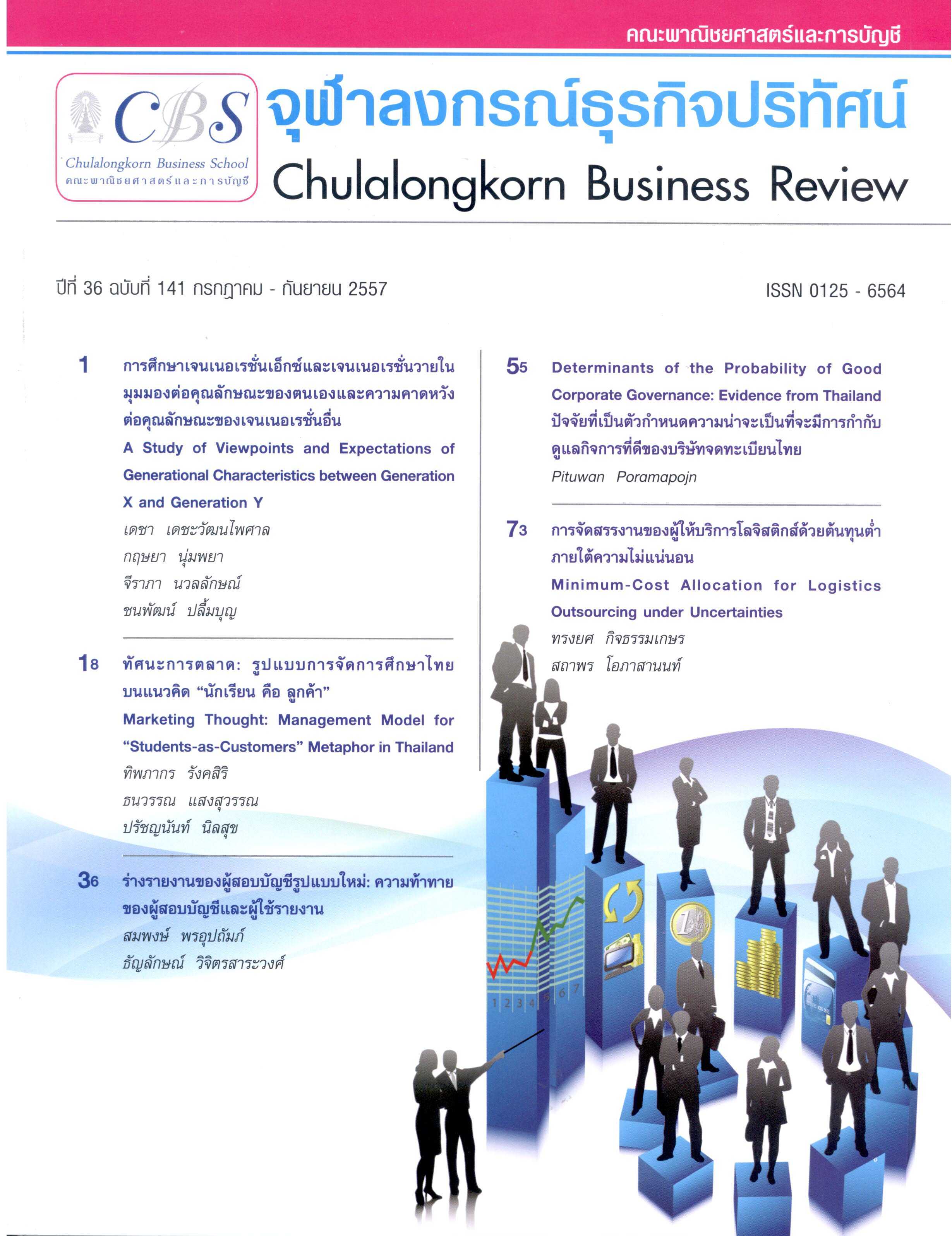ทัศนะการตลาด : รูปแบบการจัดการศึกษาไทย บนแนวคิด”นักเรียน คือ ลูกค้า”
Main Article Content
Abstract
บทคัดย่อ
ปัจจุบันแนวคิด ”นักเรียน คือลูกค้า” ได้เกิดขึ้นและนำไปกำหนดเป็นกลยุทธการจัดการ ทั้งในระดับองค์กร และระดับนโยบายของรัฐด้านการบริหารคุณภาพสถานศึกษา ซึ่งปรากฏมีผู้โต้แย้งคัดค้าน และชี้ผลเสียมากมายของแนวคิดนี้ ที่จะมีต่อเยาวชนและคุณภาพการศึกษา บทความวิชาการนี้ ผู้เขียนได้วิเคราะห์สาเหตุช่องว่างที่ทำให้เกิดความขัดแย้งทางความคิดใน 2 ฝ่าย และนำเสนอรูปแบบการจัดการศึกษาไทย บนแนวคิด” ”นักเรียน คือลูกค้า” ที่พัฒนาขึ้นบน หลักบริหารการตลาดสมัยใหม่ ที่ผสมผสานกับทฤษฎีความต้องการของมนุษย์(Maslow’s Hierarchy of Needs) และการเรียนรู้โดยผู้เรียนเป็นศูนย์กลาง (Student-centered Education) ตามแนววิถีพุทธของไทย เพื่ออธิบายและเติมเต็มช่องว่างระหว่างความขัดแย้งของ2ฝ่ายดังกล่าว และนำไปสู่แนวทางการปฏิบัติที่เหมาะสม อันจะทำให้นโยบาย”นักเรียน คือ ลูกค้า” เป็นที่เข้าใจและยอมรับในความหมายที่ถูกต้อง ตรงกัน และนำมาซึ่งประโยชน์ต่อผู้เรียน สังคม และ ประเทศชาติอย่างแท้จริง สอดคล้องกับเจตจำนงค์ที่ดีงามของการศึกษา
คำสำคัญ: แนวคิดการตลาดสมัยใหม่ รูปแบบการจัดการ ลูกค้า แนวคิดนักเรียนคือลูกค้า ทฤษฎีความต้องการของมาสโลว์ การเรียนรู้โดยผู้เรียนเป็นศูนย์กลาง แนวการสอนวิถีพุทธ
Abstract
At present, the concept of “students-as-customers” has emerged and it has been applied to the formulation of management strategies at the level of organization and public policy pertaining to quality management of educational institutions. This concept has drawn opposition that pointed out many of its shortcomings which might have negative repercussions on the youth and educational quality. In this academic article, the author analyzes causes and gaps, which might bring about two polarized views, and proposes a management model for the Thai educational context based on the “students-as-customers” concept. To develop this model, modern marketing principles, Maslow’s Hierarchy of Needs and student-centered education guided by Thai Buddhist values are integrated. The purpose is to provide explanation, fill in the gaps between these two opposing sides, and derive at a suitable practical approach. Ultimately, the “students-as-customers” policy will be commonly understood and accepted in the right context for the interests of students as well as our society and nation in accordance with the noble intent of education.
Keywords: Modern Marketing Concept, Management model, Customer, Student-as-Customer metaphor, Maslow’s Hierarchy of needs, Student-centered Educational approach, Buddhism way of teaching
Article Details
Opinions and discussions in papers published by the Creative Business and Sustainability Journal (CBSJ) are deemed as personal opinions and the responsibility of the writers. They are not the opinions or responsibility of the Chulalongkorn Business School of Chulalongkorn University.
Papers, content, information etc. appearing in the Journal are deemed to be the copyright property of the Chulalongkorn Business School of Chulalongkorn University. Anybody or any organization that wishes to publish any part of them or use them in any way must obtain written permission from the Chulalongkorn Business School, Chulalongkorn University.


